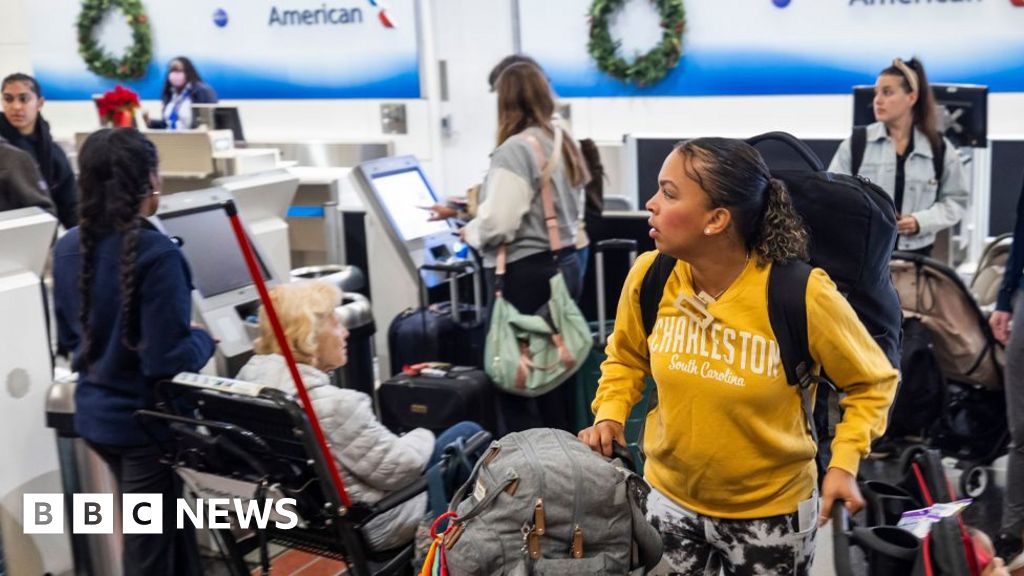Thanksgiving travel: ‘Arctic outbreak’ forecast in some places as millions travel

Much of the eastern US could experience a wave of bad weather as travellers hit the roads and airports for the Thanksgiving holiday.
The National Weather Service (NWS) has forecast “a significant arctic outbreak” across a swathe of the country, during what tend to be the busiest travel days of the year in the US.
Heavy snow and rain were forecast over the Colorado Rockies on Wednesday – part of a weather system that will intensify and move eastward later on Thanksgiving Day. More than 10in (25cm) of snow could fall in some areas.
Temperatures are also expected to drop to bitter lows across many areas.
The arctic blast could send temperatures as low as -30F to -40F (-34C to -40C) in the northern Plains and Upper Midwest, said BBC Weather forecaster Matt Taylor.
The storm is expected to advance into the Midwest area on Friday and through the weekend, where it will also bring with it “lake-effect” snow and severe thunderstorms.
Lake-effect snow happens when cold air passes over the unfrozen and relatively warm waters of the Great Lakes, causing the air to rise and form clouds which grow into a narrow band that produces 2-3in of snow per hour or more, the NWS says.
Places that could see a large dump of snow include the interior of New England and the Appalachians.
In the Midwest and Great Lakes region, there is a possibility of 4-8in of snow over the northern coastline of Michigan, according to the NWS.
The severe conditions come at a hectic time for travel.
Flight disruptions began on Wednesday, with more than 3,800 flights in the US delayed, and 861 cancelled, according to FlightAware.
The Federal Aviation Administration said delays were possible at airports across the US, including in Denver, Salt Lake City, Las Vegas, Minneapolis, Tampa Bay, Los Angeles, Dallas, Boston and Seattle. A ground delay was also in place at Newark Liberty Airport in New Jersey because of staffing shortages.
The US Transportation Security Administration (TSA) says passenger volumes during this year’s Thanksgiving have already reached record highs.
The busiest days were expected to be Tuesday and Wednesday, before Thanksgiving, as well as the Sunday after the holiday. The TSA expects to screen nearly nine million people at airports during those three days.
Meanwhile, a record number of nearly 80 million Americans are expected to travel at least 50 miles (80km) by car over the week, according to insurance company AAA. The anticipated increase is due to petrol prices that are lower than they were during the Thanksgiving holiday last year.
The Thanksgiving rain and snow over the eastern US come after a winter storm in California, on the west coast. This brought heavy snow for higher elevations earlier this week, as well as wind gusts as strong as 50 mph (81km/h).
Central California was also hit by another “atmospheric river” event on Tuesday after experiencing a similar phenomenon last week. The weather event occurs when water evaporates into the air and is carried along by the wind.
And in the Pacific north-west, communities are still recovering after last week’s bomb cyclone, an intense weather event that takes place when air pressure quickly drops off the coast.
The storm caused mass flooding and power outages for hundreds of thousands of people.
Those affected areas could face even more wet weather this week, as the NWS is predicting a low pressure system that will cause coastal rain for Washington, Oregon and California.
Related
Canada says too little, too late as Trump flip-flops on…
Nadine Yousif and Ali Abbas AhmadiBBC News, TorontoWatch: Canadian liquor store clears out US alcohol in response to tariffsNot long after the US imposed their
Vietnam, Thailand, and Philippines Among Top Asian Destinations Most-Searched by…
Home » Philippines Travel News » Vietnam, Thailand, and Philippines Among Top Asian Destinations Most-Searched by American Travelers, Driven by Surge in Viet
Trump tariffs tarnish ties: Americans anxious about travel to Canada…
Will Trump's tariffs on Canadian goods entering the U.S. affect tourism at home, tarnishing ties Canadians and Americans have shared for decades? It's a fair qu
Looming Trump travel ban strikes fear in Afghans who worked…
Expectations that President Donald Trump will soon bar Afghans and Pakistanis from entering the United States has set off panic among Afghans who were promised











